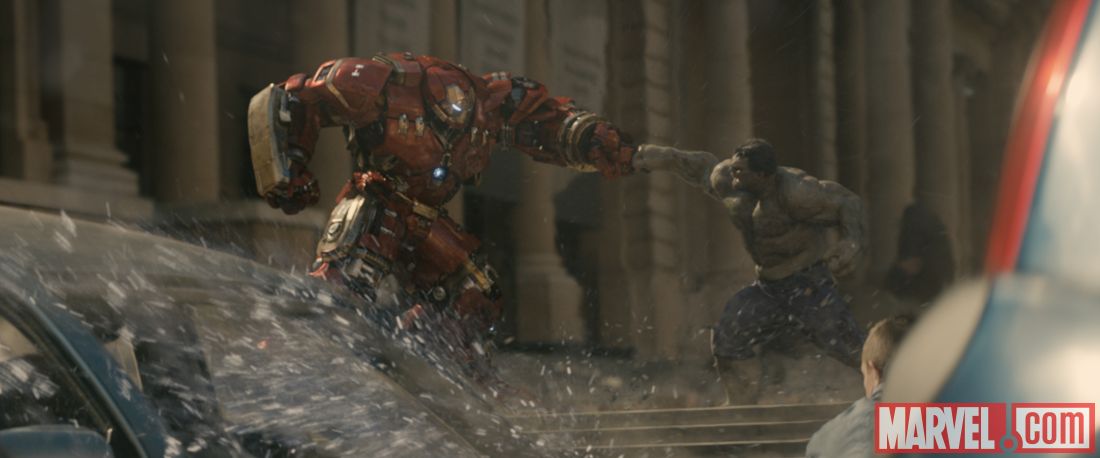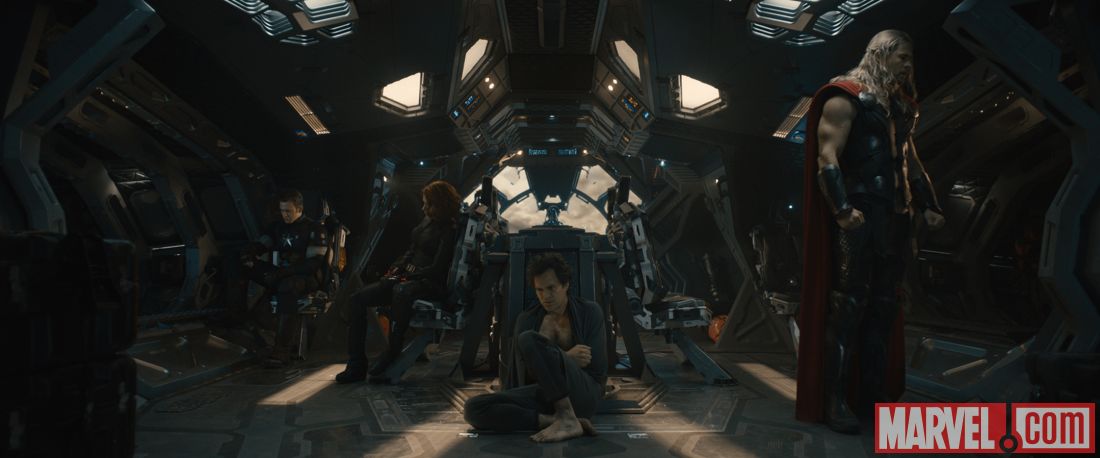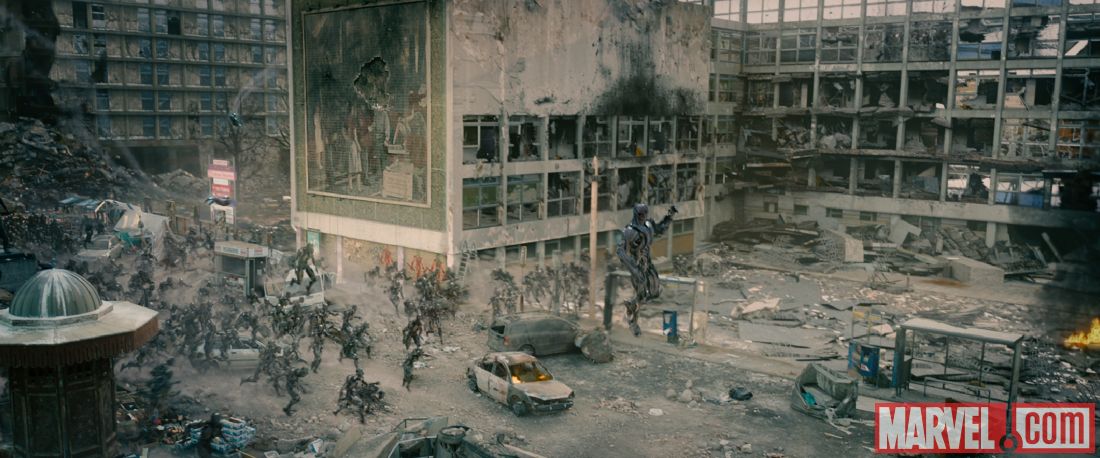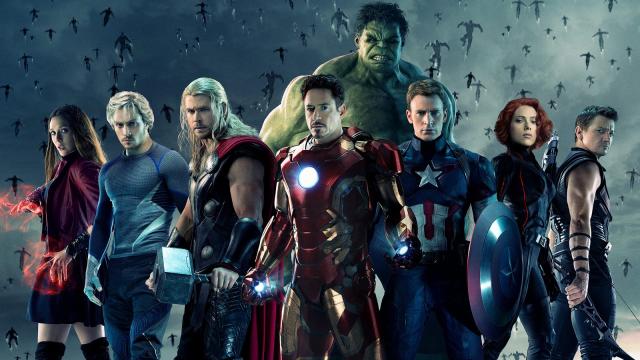As I watched the new Avengers movie on Monday night, I couldn’t stop thinking about Superman. Specifically, I got stuck on the idea that Age of Ultron felt like a much more heroic superhero movie than Superman’s last cinematic outing, Man Of Steel.
Spoilers follow for Man of Steel and Avengers: Age of Ultron.
Man of Steel went dark in its interpretation of Kal-El’s mythos. Some would say too dark, that the character was barely recognisable as a Superman. The trailer for Batman v. Superman — complete with a Dark Knight who seems intent on making Superman bleed — indicates that the sequel will be staying in that desaturated mood. While Age of Ultron shoulders its own heavy themes, it’s different from Man of Steel in one crucial way: it goes out of its way to show the Avengers saving the lives of individual people. A lot.
One of the big questions that fans asked after watching Man of Steel was just how many people died as a result of Superman’s megaton battles with other Kryptonians. Combine all that destruction with the paucity of scenes where he actually protects people and an ending where he kills archenemy General Zod and it’s hard to see where director Zack Snyder established the character’s stance on the sanctity of life.
By comparison, the biggest battle scenes in Age of Ultron — directed by Joss Whedon — are rife with moments where Earth’s Mightiest Heroes get people out of harm’s way or deal with the repercussions of their actions have on innocents. A building about to come down? Iron Man scans it for life signs. Hulk goes apeshit in a heavily populated area? Banner wallows in guilt and shame. The one scene where it looks like a hero explicitly ends a bad guy’s life? Director Joss Whedon cuts away from the deed, leaving it ambiguous as to what actually happens. Killing isn’t cool in Avengers: Age of Ultron. That’s a very un-Marvel place to wind up.

Now, I’m not much one for ascribing specific tonalities to Marvel or DC. In 2015, writers, editors and creative talent all go back and forth from one publisher to another and they carry their proclivities with them. But there’s a long history of Marvel and DC branding themselves in specific ways that can’t be ignored. Traditionally, Marvel Comics has been the “edgier” shop when it comes to the big two superhero purveyors.
Despite their complicated relationship with their history, DC sells itself as a rich modern-day mythology with a Christ-figure sun deity, a vampire-demon lord of darkness and a Greco-Roman warrior goddess at its centre. The publisher’s major cities don’t actually exist and are idealised representations of places like New York, Cincinnati, Detroit or Seattle. In short, for some fans (and creators), DC is still synonymous with a toothless, wholesome naivete that they decry as boring. These characters are icons, hovering off the ground by dint of alien, celestial or 1% heritage. Readers are supposed to aspire to be like them in one way or another.
On the opposite pole lies Marvel. When the company presented the Fantastic Four in 1961, it put them in New York City and gave them squabbles like the family who might live next door to you. Spider-Man had the same kind of grounding, what with his constant money troubles and the missed opportunity to stop the man who killed Uncle Ben. The X-Men concept revolves around the idea of systemic prejudice. Iron Man presented a weapons manufacturer as a hero to envy. This — as Stan Lee, compatriots and successors would say — was the world outside your window. These characters were relatable and even fallible. You could be these characters, with the right chromosomes or radioactive accidents.

The characters who are standard-bearers for Marvel and DC also speak to these longstanding sensibilities. One of Marvel’s most popular characters, the now-dead Wolverine, is a stone-cold killer. His popularity came from the fact that he did what so many other superheroes didn’t. He’s killed on command and for vengeance. He generally doesn’t feel bad about it. It’s the opposite of naive.
Compare this to Batman, the DC character who eclipses even Superman in popularity. He’s dark as hell but doesn’t kill. If Bat-allies like Red Hood or Huntress cross the line and take lives, he makes a point to shut them down hard. After watching his parents die in front of him, his whole raison d’etre is to prevent death. That’s been a defining feature of DC Comics’ most important core characters.
Mind you, Avengers: Age of Ultron still bears many of the hallmarks of the Marvel comics formula. They bicker and threaten each other. Captain America is still presented as a man out of his own time, a tether to a more polite kind of heroism. Tony Stark’s sense of outsized ego and responsibility struggles with his ambition and guilt and the seeds for the movie’s robotic villain begin there.
Ultron here is more fun than he’s ever been in the comics. This is a super-smart AI who talks shit with chilling amusement. He knows he’s better than humanity, and thanks to James Spader’s voice acting, you believe him. His quest to destroy the human race opens up the scope of the Marvel Cinematic Universe, letting Whedon sprinkle the movie with signifiers for the global contempt for American influence. The Avengers’ actions cause massive amounts of damage every time they fight bad guys and the world doesn’t quite view them as saviours anymore.

Is there so-called ‘destruction porn’ in Age of Ultron? Yes, tons of it. But the heroes’ desire to save lives is established and reinforced throughout the movie. All we got in terms of regret or awareness of repercussions in Man of Steel was Superman screaming “No!” after killing Zod. Look, if I’m expected to suspend belief enough to allow for a solar-powered flying man, then I also want a fantasy that also tell me he can save a couple of thousand people. Really, I want a Superman who saves everyone. But, if the last Superman movie is any indication, that’s an idea that seems unmarketable to DC/Warner Bros. powers-that-be. Avengers: Age of Ultron shows that superhero movies don’t just have to be concerned with ultra-kewl special effects battles and merchandising opportunities. They can focus on the best aspects of the superhero construct, which is that those who are more powerful than mere mortals really care about the people they fly above. The last Superman movie didn’t give me that but the new Avengers does it in spades.

Comments
43 responses to “In Age Of Ultron, The Avengers Do The Thing That Superman Didn’t”
Killing isnt cool in ultron nor was it cool in MoS. Careful Evan your bias is showing.
He does have a point though. MoS was mass-destruction …..to prevent mass-destruction.
Depending. While not a perfect movie by any means and infact pissed me off a few times, the analysis here is very biased and shows it repeatedly. Personally I found ultron to be too ‘safe’ in its construction And execution. It was good but ultimately a bit of time filler that only truly served to introduce Vision.
meanwhile….how good was Vision.
Friggin superb
Superman sacrificed a city to save the world. Captain America was faced with a similar choice, until the Deus Ex Machina of Fury showed up to take that choice away and grant a happy ending. Not to mention AoU featured pleanty of mass destruction that would have resulted in civilian casualties, or at least injuries. All those flipping cars during that chase scene had drivers after all.
I think AoU was better than MoS, but can we please stop pretending Superman was purposefully trying to kill people, or that a story is lesser because the hero can’t save everyone.
I think the problem was that, for the most part, ‘Superman’ didn’t even seem to WANT to try save them.
He didn’t even think to try save any of the potential casualties or keep them to a minimum (Which the Avengers did, continuously). He only saved relatives, people he cared about, or key ‘political’ or ‘plot point’ characters.
You’d think a dude that can level a city would be aware of what he can do, and exercise caution.
He was only trying to save the whole planet from being terraformed. Unlike the Avengers, Superman didn’t have the luxury of being able to be in multiple places at once.
You can bet just as many people died in AoU or even the first Avengers as they did in the third act in MoS. Whedon is just better at masking the fact than Snyder.
One of the major issues with that train of thought is that Superman is 1 hero, the Avengers are a team. Superman is dealing with Zod himself, but the Avengers have multiple members who can run around doing that stuff. I seem to also remember Superman saving people at the end from being killed, but people rather selectively avoid that… It’s also disingenuous to think they’re always rescuiing people. While they do in part 2, in part 1 it’s mentioned a handful of times and that’s it. However you do get great shots of Clint downing chitauri air bikes without a care, Hulk riding a giant space worm through buildings, smashing through them himself, and not worrying about the damage. The fighting over the two movies has gotten absolutely retarded in its stupidity to be honest, and the fact people seem offended that a fictional character didn’t save fictional people is almost laughable realistically, but I also ask you this: Will people chastise Avengers 2 for its wanton destruction? This article avoids pointing out the hundreds of people that most definitely, if not thousands, that definitely would have perished during the final sequence (there is NO way noone died, not a chance. Not one chance in hell). It also refuses to point out Wakanda, the Hulk vs Hulkbuster fight. The destruction there was almost MOS level. People most definitely got injured around there and to be frank with the destruction it would be easy to leap to the conclusion a fatality could have happened. Sure Hulk was raging and wouldn’t really go elsewhere so Tony had to fight him there………
It’s almost exactly like the situation with Zod 😉
Yes and I have to point out that, for me to ‘fight over the two films’, I’d have to actually care about either to start off. I didn’t find either particularly great, although I’d say MoS was more ‘intriguing’ while Avengers AoU was more fun to zone out too? Neither were particularly weighty for me. (My opinion of course, not saying that’s how it is for everyone.)
My point is that the Avengers, while still undoubtedly killing, maiming, etc, along the way, did TRY to limit it more than once. Supes in MoS didn’t seem particularly phased that he was levelling an entire city (For the most part).
I’d also debate that destruction in Avengers was mostly caused by villains, with Tony even pulling Hulk away from civilians multiple times, or even evacuating the elevator before hurling it. MoS seems to take the approach of ‘these people are dying anyway, so why bother trying to help.’
Again that’s for the most part, not necessarily all the time, but it’s superman. The ‘boyscout’ we’re talking about lol.
All I know is that I’m not so sure how many times I can watch the same movie over and over. I know, there is a basic structure most films follow, but some take it way past the simple ‘blueprint’ approach, much like Ubisoft games do.
Marvel (And Disney) seem to be in a rut IMHO.
Am a huge fan of Superman character but MoS was not a great Superman film. The work overall had some interesting elements and scenes but it did not make us fall in love with Supes again.
Ulton on the other hand….wow. That was a blast. Made me fall in love with these characters all over again. Even Hawkeye was great in it….and thats saying something.
You mean Xander 2.0? I’m just a regular type guy with a bow and leather jacket but I’m the glue that holds the team together.
Agreed though, MoS was not a great Superman film, it wasn’t a terrible film but I found superman returns to be a great deal more entertaining as a superman film. Maybe when he gets paired up against/with other DC personalities he becomes more like the superman we expected him to be, in the same way that Hulk really only works as part of a team and struggles with solo outings, but he really should be able to carry his own movie and failed in MoS, Snyder could and should have done a lot more to let Supes shine (both figuratively and literally).
Yeah, I have never been a fan of the ‘archer’ gimmick. Either Green Arrow OR Hawkeye. At least Ollie had more personality. Hawkeye… yeah, I couldn’t give a shit. And I didn’t in any of the Marvel movies yet, either. Ultron gave him a few scenes that I think he sorely needed for me to sympathize with him at all.
They’ve really dropped the ball with Hawkeye. He’s supposed to be from the circus, have a purple costume, and to be fairly acrobatic. He was also originally antagonistic to Captain America; challenging him constantly for leadership etc. To fix it, they first need to commit to the costume. It’s like how in the X-Men movies they don’t really do the proper costume thing, like they are afraid to or something(it can look gaudy if it’s not done right- like Captain America’s stage one… but then if they commit to it like Iron Man or Spider-Man, it works). This is exactly the same problem with Dr Doom… Iron Man works fine on screen, just make him EVIL Iron Man instead of the reimaginings and it’s done. The other thing is the script… AoU came across to me like the actors were having good times with gags… but it was gags out of character and it detracted from the experience. Finally, to cement someone like Hawkeye, you just need to make him badass by giving him the scenes and lines. Think of Quicksilver and Nightcrawler in the X-Men movies. Do that with trickshots and special arrows and a one liner or two. Profit.
Idk what I thought of AoU really. The main thing I hated was CGI Ultron lips. What makes solid metal ripple when a robot talks? Ugh. Was a bit disjointed overall and the bonus scene SUCKED.
Those metal lips really did bother me, couldn’t keep from staring at them.
The bonus scene was pretty ‘meh’ but expecting a second one to be added once it airs in the US. The schwarma scene wasn’t shown in the first week or so of Australian airing.
I really hope they add another… that mid credits one was just a bit anti-hype/climatic.
Actually wasn’t Hawkeye AND Black Widow originally Iron Man villains?
Yeah I think so, but his origin-origin was from the circus. That’s very significant for a movie, because he isn’t supposed to just stand there and shoot arrows. He should be able to do backflips, etc. And the antagonism to Captain America would also give him some depth in the movie. I feel like a lot of the characters and their costumes need tweaking/overhauls to bring them more in line with their comic/cartoon/UMvC3 counterparts. Some things are minor nitpicking, some are major “what are you doing with your IP Marvel?”.
To be fair IIRC these version of the characters are loosely based on the Marvel NOW! alternate universe. Hence their not going to be 100% in sync w/ the “original” universe versions.
That’s true(I think it might be Ultimate?), but it’s still a matter of doing a comparable quality version of the character for the big screen. Like you can take a reimagined character and put them up there, but is it better or worse or roughly the same? Nick Fury can come in two comparable flavours and it’s fine, but when you take someone awesome like Dr Doom and get rid of everything that makes him Dr Doom, then you should be fairly confident that you’re making that change, because Dr Doom is freakin’ awesome to begin with. Losing the purple costume(which is still prevalent nowadays with stuff like the cartoon and games) and his unique background and edginess just was a mistake imo. Same deal with Rogue in X-Men.
… Hulk buster!
*mic drop*
While it was also the case in the first film, Age of Ultron really seemed to be saying this is what heroes are. It seemed like a direct response to Man of Steel.
To me it’s a problem when Hulk and Iron Man appear way more heroic than Superman
I think the difference is Marvel hires directors who like their characters just the way they are. DC seems to pick directors who think their characters are pretty neat but could do with extra x to make them more cool.
Assuming you mean
Vision killing Ultron. I wouldn’t say it would be ending their life. More like a permanent shutdown of a computer. Although it does lead to an ethical debate about advanced A.I. and whether they are classed as people.“and whether they are classed as people.”Ah, ‘humanity’, the central question of most Sci-Fi.
So…
Does this mean Vision will have to die so that Thanos can capture the mindstone in Avengers 3 & 4???IDK, probably. TBH, I thought he did lol. I’m more casual when it comes to Marvel than DC (Well, older DC).
I hope not, but I’m starting to mentally prepare myself for that possibility now.
I will be so pissed if that genteel accent stops appearing in Marvel movies.
Or at least taken out of commission, I dare say it will be a driving plot point to defeat Thanos restore him to life.That’s probably a pretty accurate guess.
I think it’s telling (and surprised it wasn’t emphasised more in this article) that fully HALF of the final battle in Age of Ultron was focused on evacuating the civilians of Sokovia. Iron Man says they have to sacrifice the civilians or the entire world will die; the Captain says no. Because he knows that unless you do everything you can to save as many lives as possible, you’re not a superhero. You’re just a guy with powers.
DC doesn’t want to make movies about superheros. That’s their choice. But then I’m forced to wonder why they’re using goddamn Superman to do it.
Saw Age of Ultron yesterday… A sad shadow in comparison to the first Avengers movie. It tried too hard to be ingenious all it did is confuse the audience in explosions and mass destruction. PS Don’t pay the extra $$$ on 3-D… Waste of money. Watched Man Of Steel a few hours ago and I go ‘dark’ over ‘stupid’ every time.
I for one I like that MoS put the hero in a lose-lose situation without giving him some BS cop-out invisible third option where everyone gets a happy ending. Yes the character wasn’t very faithful to the lore, but for the first time they showed a clash of what are essentially gods who are never holding back.
I love the Marvelverse but I’m glad there is a darker alternative.
This ^
Gotta agree. Though I do like Evan has missed the point Superman has *never* ever taken an oath to never kill. He’s only ever promised not to kill those weaker than him or to never kill if there’s another alternative.
You’re expecting a bit too much from someone who appears to be a card-carrying member of Team Marvel.
I think the writer of this article is being a little harsh on Man of Steel. Then again a lot of people are in my opinion. Disregarding other areas of film discussion saying the amount of people that are saved is not enough is stupid. I felt Age of Ultron had too much and it bloated the running time. I enjoyed it up till around half way through the final fight as it just got too repetitive.The last part was way worse than the length of the fight with Zod in Man of Steel. The linked video shows what I am talking about. Also just want to say that scene in Iron Man 3 when he saves the people from the plane with a human chain was more impressive than all the random “saving” in Ultron.
Also Thor throws a person into the sky at a ridiculous speed to save them. They would live but their arm would either be broken or ripped clean off.
Batman drops a guy off a roof in Dark Knight and Daredevil puts a guy in a coma on Netflix and nobody cares, but Superman is presented as being fallible and vulnerable while risking his life to save the world and he’s no longer Superman? Come on.
I liked Man of Steel. It showed me a Superman that had to struggle for his victories; he couldn’t just snap his fingers and travel through time to solve his problems. The story felt authentic; what would happen if a mad Kryptonian war criminal attacked Metropolis? Widespread destruction.
We’ll just pretend the Punisher just gives people a stern talking to shall we?
You missed the point where you drop the mic and walk off…
Superman didn’t cause any damage. Without Superman, his enemies would have destroyed the whole Earth and conquered it. Also, I didn’t want to see cheezy scenes where Superman goes and saves a baby or puppy dog. To me, I enjoy DCs darker take on comics. Marvel movies are good, but a bit too colourful and cheezy. Dark Knight proves this as still the best comic movie series ever. Watchmen was awesome too. Oh, by the way, the destruction of Hulk, who wasn’t even fighting a villian was just as bad as the destruction in MoS. Think before you rant.